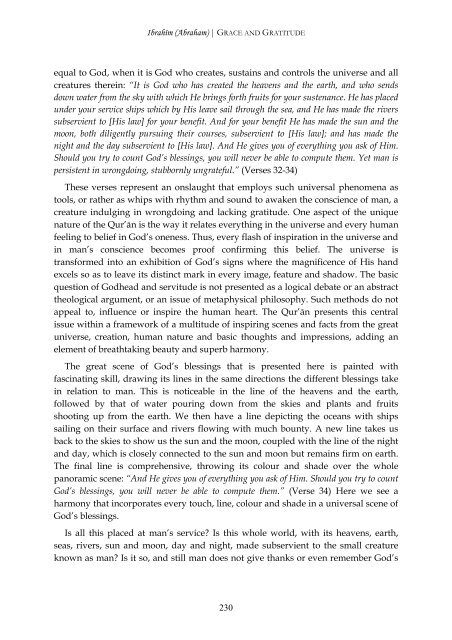Volume 10 Surah 12 - 15 - Enjoy Islam
Volume 10 Surah 12 - 15 - Enjoy Islam
Volume 10 Surah 12 - 15 - Enjoy Islam
You also want an ePaper? Increase the reach of your titles
YUMPU automatically turns print PDFs into web optimized ePapers that Google loves.
Ibrahīm (Abraham) | GRACE AND GRATITUDE<br />
equal to God, when it is God who creates, sustains and controls the universe and all<br />
creatures therein: “It is God who has created the heavens and the earth, and who sends<br />
down water from the sky with which He brings forth fruits for your sustenance. He has placed<br />
under your service ships which by His leave sail through the sea, and He has made the rivers<br />
subservient to [His law] for your benefit. And for your benefit He has made the sun and the<br />
moon, both diligently pursuing their courses, subservient to [His law]; and has made the<br />
night and the day subservient to [His law]. And He gives you of everything you ask of Him.<br />
Should you try to count God’s blessings, you will never be able to compute them. Yet man is<br />
persistent in wrongdoing, stubbornly ungrateful.” (Verses 32-34)<br />
These verses represent an onslaught that employs such universal phenomena as<br />
tools, or rather as whips with rhythm and sound to awaken the conscience of man, a<br />
creature indulging in wrongdoing and lacking gratitude. One aspect of the unique<br />
nature of the Qur’ān is the way it relates everything in the universe and every human<br />
feeling to belief in God’s oneness. Thus, every flash of inspiration in the universe and<br />
in man’s conscience becomes proof confirming this belief. The universe is<br />
transformed into an exhibition of God’s signs where the magnificence of His hand<br />
excels so as to leave its distinct mark in every image, feature and shadow. The basic<br />
question of Godhead and servitude is not presented as a logical debate or an abstract<br />
theological argument, or an issue of metaphysical philosophy. Such methods do not<br />
appeal to, influence or inspire the human heart. The Qur’ān presents this central<br />
issue within a framework of a multitude of inspiring scenes and facts from the great<br />
universe, creation, human nature and basic thoughts and impressions, adding an<br />
element of breathtaking beauty and superb harmony.<br />
The great scene of God’s blessings that is presented here is painted with<br />
fascinating skill, drawing its lines in the same directions the different blessings take<br />
in relation to man. This is noticeable in the line of the heavens and the earth,<br />
followed by that of water pouring down from the skies and plants and fruits<br />
shooting up from the earth. We then have a line depicting the oceans with ships<br />
sailing on their surface and rivers flowing with much bounty. A new line takes us<br />
back to the skies to show us the sun and the moon, coupled with the line of the night<br />
and day, which is closely connected to the sun and moon but remains firm on earth.<br />
The final line is comprehensive, throwing its colour and shade over the whole<br />
panoramic scene: “And He gives you of everything you ask of Him. Should you try to count<br />
God’s blessings, you will never be able to compute them.” (Verse 34) Here we see a<br />
harmony that incorporates every touch, line, colour and shade in a universal scene of<br />
God’s blessings.<br />
Is all this placed at man’s service? Is this whole world, with its heavens, earth,<br />
seas, rivers, sun and moon, day and night, made subservient to the small creature<br />
known as man? Is it so, and still man does not give thanks or even remember God’s<br />
230

















